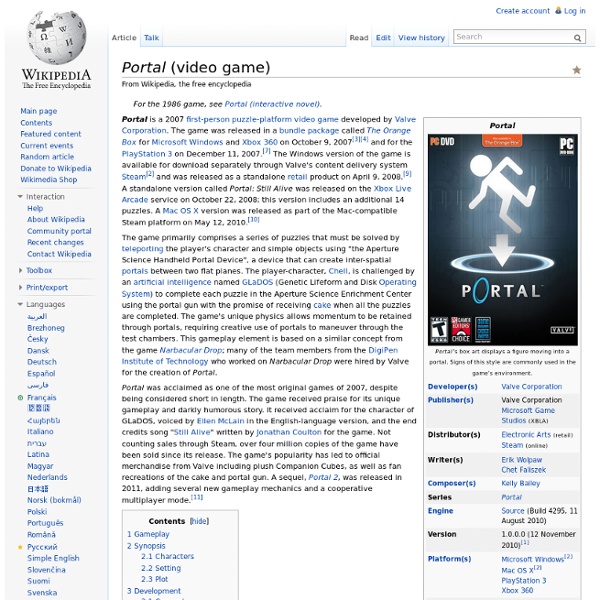Thracia (video game)
The game was also one of the first MMORTTBS(Mass Multiplayer Online Real-Time Turn Based Strategy) ever launched. As such, it managed to carry on the tradition of the classic turn-based gameplay made popular by famous titles like: Heroes Of Might and Magic or the Disciples series, while adding the online component. Thracia does not require players to install any client on their computers, therefore it offeres greater mobility than its predecessors. The game is divided into three modules: the kingdom, the great map of Thracia and the battle mode. The kingdom module is similar to the town view in HOMM. The battle mode module is the classic turn based part of the game. There are three races to pick from when creating a new account: the Elves, the Orcs and the Thracians. Each race has a different city view with twelve unique buildings. The great map is divided up into nine main regions. Every city in Thracia has a single hero.
Fallout 3
Fallout 3 takes place in the year 2277, 36 years after the setting of Fallout 2 and 200 years after the nuclear apocalypse that devastated the game's world, in a future where international conflicts between the United States and China culminated in a Sino-American war in 2077, due to the scarcity of petroleum reserves that ran the economies of both countries. The player character is an inhabitant of Vault 101, a survival shelter designed to protect up to 1,000 humans from the nuclear fallout. When the player character's father disappears under mysterious circumstances, the leader of the Vault initiates martial law and sends security forces after the player, who is forced to escape from the Vault and journey into the ruins of Washington, D.C. to track their father down. Along the way the player is assisted by a number of human survivors and must battle myriad enemies that inhabit the area, now known as the "Capital Wasteland". Gameplay[edit] Attributes[edit] Health and weapons[edit]
The Mud Connector | Hundreds of Free Text-Games, Reviews and More
Halo: Combat Evolved
Halo has been praised as one of the best and most important video games of all time,[13][14] and was ranked by IGN as the fourth best first-person shooter of all time.[15] The game's popularity has led to labels such as "Halo clone" and "Halo killer," applied respectively to games either similar to or anticipated to be better than it.[16][17][18] In addition, the game inspired and was used in the fan-created Red vs. Blue video series, which is credited as the "first big success" of machinima (the technique of using real-time 3D engines, often from video games, to create animated films).[19] A high-definition remake, Halo: Combat Evolved Anniversary, was released on the 10th anniversary of the original game's release. Gameplay[edit] Halo's arsenal consists of weapons from science fiction. Combatants[edit] Multiplayer[edit] Halo: Custom Edition[edit] Synopsis[edit] Setting[edit] Characters[edit] Plot[edit] Voice cast[edit]
DeepLeap: The Fast-Paced Time-Wasting Word Game!
The Elder Scrolls
The Elder Scrolls is a series of action role-playing open world fantasy video games primarily developed by Bethesda Game Studios and published by Bethesda Softworks. The series is known for their elaborate and richly-detailed open worlds and its focus on free-form gameplay. Morrowind, Oblivion and Skyrim all won multiple Game of the Year awards from various outlets. Development history[edit] Before The Elder Scrolls[edit] Prior to working on The Elder Scrolls series, Bethesda had worked predominately with sports and action games. Arena[edit] Peterson and Lakshman were joined by Julian Lefay who, according to Peterson, "really spear-headed the initial development of the series Bethesda missed their Christmas 1993 deadline. Daggerfall[edit] A first-person screenshot from Daggerfall, demonstrating the user interface and graphical capabilities of the game. Battlespire and Redguard[edit] Morrowind[edit] The project took "close to 100 man-years to create". Oblivion[edit] Skyrim[edit] Online[edit]
Eternity II puzzle
The Eternity II puzzle The Eternity II puzzle, aka E2 or E II, is a puzzle competition which was released on 28 July 2007.[1] The competition ended at noon on 31 December 2010. It was published by Christopher Monckton, and is marketed and copyrighted by TOMY UK Ltd. A $2 million prize was offered for the first complete solution. Puzzle mechanics[edit] The Eternity II puzzle is an edge-matching puzzle which involves placing 256 square puzzle pieces into a 16 by 16 grid, constrained by the requirement to match adjacent edges. Each puzzle piece has its edges on one side marked with different shape/colour combinations (collectively called "colours" here), each of which must match precisely with its neighbouring side on each adjacent piece when the puzzle is complete. Two Clue Puzzles were available with the launch of the product, which, if solved, each give a piece position on the main 256-piece puzzle. Solution submissions[edit] The second scrutiny date was noon GMT on 31 December 2009.
The Elder Scrolls IV: Oblivion
The Elder Scrolls IV: Oblivion is an action role-playing video game developed by Bethesda Game Studios and published by Bethesda Softworks and the Take-Two Interactive subsidiary 2K Games. It is the fourth installment in The Elder Scrolls action fantasy video game series, following The Elder Scrolls III: Morrowind and preceding The Elder Scrolls V: Skyrim. Oblivion was first released in March 2006 for Microsoft Windows and Xbox 360. A mobile phone version of the game was released in May 2006, and a PlayStation 3 version was shipped in March 2007. After a number of smaller content releases, a major expansion pack, Shivering Isles, was distributed. The Elder Scrolls IV: Oblivion Game of the Year Edition (a package including both Shivering Isles and the official expansion pack Knights of the Nine) was released in 2007 for Microsoft Windows, Xbox 360, and PlayStation 3. Gameplay[edit] The inventory interface, where the player garbs, armors, and equips his or her character Plot[edit]



